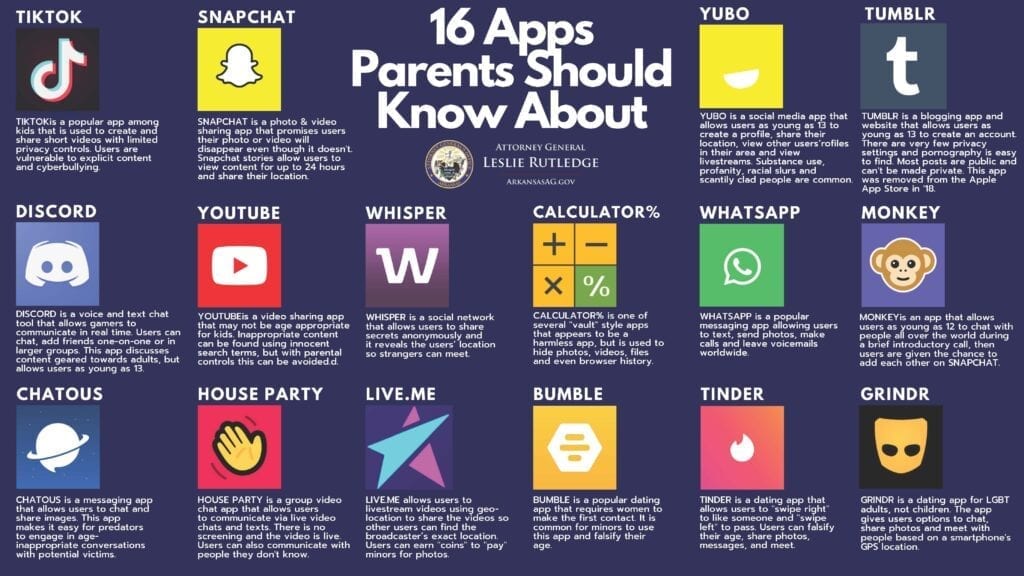
Arkansas parents across the state want what is best for their children. So many Arkansans benefit from technology, but the Attorney General’s Office routinely hears about preteens and teenagers who are bullied or have started relationships with strangers online.
“Keeping Arkansas kids safe is a top priority,” said Attorney General Leslie Rutledge. “Being informed, opening every app on your child’s phone and knowing who they are talking to are some of the best ways we can protect our kids from predators and online bullying.”
Rutledge is alerting parents to 16 smartphone apps that may make children vulnerable to dangers online:
• Bumble — a popular dating app that requires women to make the first contact. It is common for minors to use this app and falsify their age.
• Calculator% — one of several “vault” style apps that appears to be a harmless app, but is used to hide photos, videos, files, and even browser history.
• Chatous — a messaging app that allows users to chat and share images. This app makes it easy for predators to engage in age-inappropriate conversations with potential victims.
• Discord — a voice and text chat tool that allows gamers to communicate in real-time. Users can chat, add friends one-on-one or in larger groups. This app discusses content geared towards adults, but allows users as young as 13.
• Grindr — a dating app for LGBT adults, not children. The app gives users options to chat, share photos and meet with people based on a smartphone’s GPS location.
• House Party — a group video chat app that allows users to communicate via live video chats and texts. There is no screening and the video is live. Users can also communicate with people they don’t know.
• Live.Me — an app that allows users to live stream videos using geo-location to share the videos so other users can find the broadcaster’s exact location. Users can earn “coins” to “pay” minors for photos.
• Monkey — an app that allows users as young as 12 to chat with people all over the world during a brief introductory call, then users are given the chance to add each other on Snapchat.
• TikTok — a popular app among kids that is used to create and share short videos with limited privacy controls. Users are vulnerable to explicit content and cyberbullying.
• Tinder — a dating app that allows users to “swipe right” to like someone and “swipe left” to pass. Users can falsify their age, share photos, messages and meet.
• Tumblr — a blogging app and website that allows users as young as 13 to create an account. There are very few privacy settings and pornography is easy to find. Most posts are public and can’t be made private. This app was removed from the Apple App Store in ‘18.
• Snapchat — a photo and video sharing app that promises users their photo or video will disappear even though it doesn’t. Snapchat stories allow users to view the content for up to 24 hours and share their location.
• WhatsApp — a popular messaging app allowing users to text, send photos, make calls and leave voicemails worldwide.
• Whisper — a social network that allows users to share secrets anonymously and it reveals the users’ location so strangers can meet.
• Yubo — a social media app that allows users as young as 13 to create a profile, share their location, view other users’ profiles in their area and view live streams. Substance use, profanity, racial slurs, and scantily clad people are common.
• YouTube — a video sharing app that may not be age-appropriate for kids. Inappropriate content can be found using innocent search terms, but with parental controls, this can be avoided.
For more information on smartphones, apps and internet safety, call the Arkansas Attorney General’s Office at (800) 482-8982 or visit ArkansasAG.gov.



